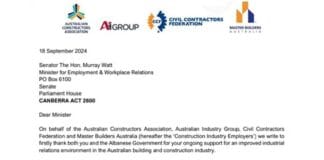A march by hundreds of workers to a union fringe event on the Labor conference’s second day was one of the few brights spots where there was some challenge to Rudd’s conservative agenda.
In the lead up to the conference, unions talked up a push to commit the Rudd government to a second round of reforming the industrial relations laws.
In particular, construction unions want Labor to scrap Howard’s construction police, the ABCC.
Plans for a protest rally outside the conference against the ABCC were cancelled under pressure from Unions NSW and replaced by a fringe meeting organised by the ACTU. But last minute pressure from building unions at least saw a march to the fringe meeting. Victorian ETU secretary Dean Mighell led the ETU contingent out of the fringe gathering to stage their own protest outside the conference.
Despite claims from the ACTU that Labor had finished Howard’s WorkChoices, the crowd of rank and file workers was unconvinced. Greg Combet, former ACTU and Rights at Work campaign leader and now Labor MP was loudly booed when his image was flashed on screen. Images of Gillard and Rudd were also jeered.
The call to scrap the ABCC was prominent in the official speeches, alongside concerns about job losses and watering down occupational health and safety laws as a result of federal “harmonisation”. The CFMEU construction union pledged to continue to campaign for “one law for all” and to defend Ark Tribe, the construction worker from South Australia who faces jail for refusing to attend an ABCC interrogation.
But inside the conference the ACTU negotiated a pathetic show of “unity” with the government to avoid a debate on the issue. The motion on the ABCC was agreed beforehand with Julia Gillard behind closed doors.
Some senior union leaders are fixated on gaining a “seat at the table” under Labor in the hope of lobbying the government for union demands. Union delegates at the conference celebrated a supposed concession wrung out of Julia Gillard that union representatives will be allowed to sit on government boards and committees on issues such as tax reform, infrastructure and superannuation.
But the strategy of lobbying Labor has done nothing to convince the government to scrap the ABCC or get rid of the rest of WorkChoices.
On August 11, only days after the Labor conference, hundreds of supporters rallied outside the Elizabeth Magistrates’ Court north of Adelaide when Ark Tribe appeared there. CFMEU SA branch secretary Martin O’Malley told the crowd “Ark Tribe is the bloody hero here today”. His defiant stand against the ABCC, like that of Noel Washington’s last year, can help give other workers confidence to kick the commission off building sites. A national stopwork rally when Ark Tribe faces court on October 30 needs to be the next step.
Buy Australian
Prior to the Labor conference, Industry minister Kim Carr headed off union demands to introduce “Buy Australian” clauses into government contracts by announcing $23 million deal to help Australian companies tender for government contracts as well as the appointment of a “procurement co-ordinator”.
As unemployment grows, calls for the government to support Australian jobs can seem to make sense. But introducing “buy Australian” quotas on government purchases is not the same as protecting jobs. Worse still, it is a diversion from rebuilding union militancy that can fight closures and job cuts.
“Buying Australian” will do nothing for the victims of the Aussie-owned banks that are making billion dollar profits while using the excuse of the global financial crisis to sack hundreds of workers.
“Buy Australian” encourages workers to identify with the boss and be concerned with maintaining the health (and profits) of Australian companies. It can encourage the acceptance of cuts to wages and conditions as a way to save jobs. Many manufacturing workers are already working short time.
Ultimately it is bosses’ efforts to lower production costs and boost their profits which causes job cuts. Bosses always put profits before workers’ jobs. Union campaigns in the 1980s to stop cuts to tariffs did not stop companies slashing thousands of jobs.
The other danger in “buy Australian” demands is that it encourages other countries to try to protect their “own” national industries in retaliation. We live in a world economy which is more globalised and interconnected than ever before. Steel manufacturers produce steel for both the domestic and export markets. Campaigning for “buy Australian” measures puts those jobs at risk.
A union strategy to defend jobs needs to start with a serious effort to challenge all of Howard’s WorkChoices laws, which criminalise most forms of industrial action.
By James Supple





